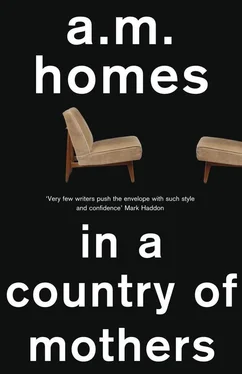The telephone rang, and she let the machine answer it. “Hi, I can’t come to the phone right now, but if you leave your name and number after the beep …” Silence. Not a hang-up, but silence. The caller was there, waiting. After thirty seconds, the machine turned itself off. It happened again later, and then again, and again, and always there was someone there on the line, waiting.
I n the kitchen, taking down glasses, wrapping them one at a time in brown paper and fitting them into a box, Claire shook, not so much a tremor as a shiver.
“It’s the house,” Sam said. “You’re nervous about moving.”
It was the house. She never wanted to go there again. If Sam knew the extent of things, the extreme to which she’d gone, he might be forced to take some action.
Jody. She wanted to talk to Jody, but there was nothing casual, nothing easy in what she would say.
The movers came, wrapped the furniture in heavy blankets, and carried cardboard boxes marked FRAGILE/KITCHEN or JAKE/BEDROOM out of the building and down to their truck. From the tenth-floor window Claire watched her life being loaded into a moving van. And when the time came, she swept through the empty rooms, opened all the closets, took one last look around, and then closed the door. As in a funeral cortege, they followed the moving van slowly, steadily up East River Drive, over the Triborough Bridge, onto the thruway, and out to Glenville. At the house, Sam unloaded her, carried her in like a piece of antique furniture. The children laughed. She kept her eyes closed. She didn’t want to see where she was, where she had been. From now on there would be an impenetrable layer between inner and outer. Fixed in this pose, she would wait. Jody knew where the house was. When she was ready, she would come.
“Where do you want the sofa?” the movers asked.
“Here,” Sam said, leading them into the living room.
Inside, they began the process of laying on hands, touching each of the brown cardboard boxes and divining where it should go. Throughout the afternoon and on into the evening there was the thick sound of packing tape being torn away. As Sam struggled to find a place for everything, to make order out of nothing, Claire hovered nervously, moving from room to room gathering trash, wads of tape, newspaper, jamming empty boxes one inside the other.
Late that night, as Sam, Jake, and Adam slept, Claire lifted tomorrow’s clothes off their hangers and slid into them, gliding from room to room like a ghost, taking inventory, counting her possessions, her children, and then let herself out of the house, taking care to lock the door behind her.
In the country night, the roar of the cicada circus swelled. Claire hurried to the car and quickly backed down the drive. Headlights on high, she navigated the twists and turns of the dark and narrow Hutchinson River Parkway with determination, hugging the middle line, more than once catching the bright eye of a wild animal in her beam. Hutch to Cross County, Saw Mill to Henry Hudson; the lights of Manhattan and the G.W. Bridge, a warm and romantic welcome home.
The office was still, the air unmoved. She turned on a lamp, checked her appointment book, sorted the magazines in the waiting room, refilled the Kleenex supply, plumped the pillows on her sofa, and then sat down in her chair, ready.
A. M. Homesis the author of several novels including Music for Torching, The Endof Alice,Jack and most recently, ThisBookWill Save Your Life, and two collections of highly-acclaimed short stories, Things You Should Know and The Safety of Objects, all published by Granta Books. She is the recipient of numerous awards including a Guggenheim and NEA fellowship. She is a contributing editor to Vanity Fair and has published fiction and essays in the New Yorker,Granta,Harper’s,McSweeney’s,Artforum and the New York Times. She lives in New York City.












